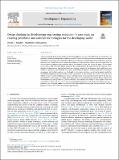Design thinking in development engineering education: a case study on creating prosthetic and assistive technologies for the developing world
Author(s)
Ranger, Bryan J.; Mantzavinou, Aikaterini
Download1-s2.0-S2352728517300684-main.pdf (1.820Mb)
Terms of use
Metadata
Show full item recordAbstract
A human-centered design thinking approach has been applied to a course at the MIT D-Lab on creating low-cost prosthetic and assistive devices for the developing world. Teams of students with diverse backgrounds are paired with international stakeholders and industry partners to tackle real-world prosthetic technology needs, learn the design process through interactive lectures and workshops in the classroom, and are given the opportunity to conduct testing of the prototypes generated during the semester at field sites around the globe. The revamped course offers a fully immersive design experience that extends beyond the classroom and the semester by stimulating further research, inspiring and motivating student professional development, raising additional grant money and generating peer-reviewed publications and intellectual property. A multifaceted and nontraditional engagement with industry partners, as developed in our course, provides a novel and promising model for development engineering courses to afford unique opportunities to their students. As a result of our new course initiatives mean student enrollment has tripled and total project continuation beyond the end of the class has exceeded 60%. In this paper, we outline our framework for incorporating human-centered design thinking into development engineering education, provide outcomes, and present case studies of select projects that have successfully emerged from our course. Our novel pedagogical approaches and collaborative efforts showcase a promising way to engage students in impact-focused project-based learning with long-term benefits for their projects as well as their career development opportunities. ©2018
Date issued
2018Department
Massachusetts Institute of Technology. Media Laboratory; Massachusetts Institute of Technology. Institute for Medical Engineering & Science; Harvard University--MIT Division of Health Sciences and Technology; Koch Institute for Integrative Cancer Research at MIT; Massachusetts Institute of Technology. Department of Materials Science and EngineeringJournal
Development Engineering
Publisher
Elsevier BV
Citation
Ranger, Bryan J., and Aikaterini Mantzavinou, "Design thinking in development engineering education: a case study on creating prosthetic and assistive technologies for the developing world." Development Engineering 3 (2018): p. 166-74 doi 10.1016/j.deveng.2018.06.001 ©2018 Author(s)
Version: Final published version
ISSN
2352-7285